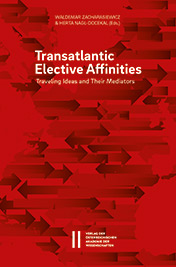
Der Band ist das Ergebnis eines internationalen Workshops, bei dem Wissenschaftler aus mehreren Disziplinen weniger bekannte Aspekte des Ideenaustausches über den Atlantik untersucht haben. Im 19. Jahrhundert verbrachten viele amerikanische Universitätsabsolventen aus den Human-, Geistes-, Sozial- und Naturwissenschaften sowie aus der Medizin, die die Fortschritte in diesen Fächern in Europa schätzten und eine Wahlverwandtschaft mit ihren europäischen Kollegen registrierten, Zeit an den Hochschulen und Spitälern im deutschsprachigen Raum und versuchten dann das amerikanische Bildungssystem nach den transatlantischen Mustern zu reformieren. Amerikanische Institutionen beschäftigten auch gerne Wissenschaftler aus Europa. Der Sammelband beschreibt ferner neue politische Bindungen nach dem Abbruch früherer Beziehungen und analysiert die Entwicklung einer transatlantischen Friedensbewegung in der Zeit des Kalten Krieges. Er skizziert auch den Einfluss der kontinentaleuropäischen Philosophie sowie von einzelnen Persönlichkeiten wie Ludwig Wittgenstein in den USA und Kanada und untersucht ebenso umgekehrt die Vermittlung neuer philosophischer Subdisziplinen (wie der Filmphilosophie) von den USA nach Mitteleuropa.
…
This volume is the result of an international workshop in which scholars from several disciplines explored less familiar instances of the exchange of ideas across the Atlantic. In the 19th century many American graduates both in the humanities, social and natural sciences as well as medicine, appreciating the progress in these fields of learning in continental Europe, and noting an elective affinity with their peers there, spent time at universities and medical institutions in German-speaking countries and then tried to reform their educational and academic institutions on the basis of transatlantic models. American institutions also recruited scientists from Central Europe for their work. The book also describes new alliances in the field of politics in the 20th century, and analyses the formation of a joint transatlantic peace movement intent on preventing a nuclear apocalypse in the Cold War. It also traces the influence of continental European philosophy and of individual philosophers such as Ludwig Wittgenstein in the USA and Canada, and investigates the inspiration of new branches of philosophy, like film philosophy, in Central Europe
2021
978-3-7001-8504-8
978-3-7001-8518-5
228 Seiten, broschiert,
22,5x15cm